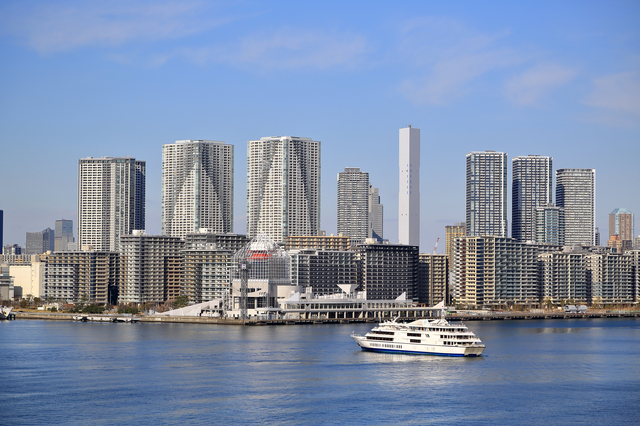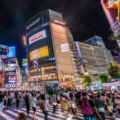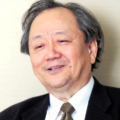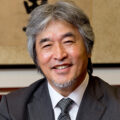“Why did you come to Japan?” — Is Japan being “exploited” by the rapidly growing number of Chinese immigrants?

Chinese immigrants are increasing in Japan. The real wealthy live in Minato Ward, the middle class buy apartment in the bay area, the educated immigrants live in Bunkyo Ward, and the Chinese who have lived in Japan for a long time live in Kinshicho…
Photo: yama1221 / PIXTA
“I don’t have 100 billion yen in cash, but if I could acquire a semiconductor-related company, there would be a lot of investors who would want to jump on board. If I could just find an acquisition opportunity, the rest would be manageable. Everyone is desperate.”
A Chinese participant at an investment briefing for Chinese people in Tokyo in June 2024 spoke with a smile. The organizer, Fosun International Limited, a major Chinese company, focuses on helping wealthy people invest in Japan.
“I have met more wealthy Chinese people in Tokyo in the past year than I have met in mainland China in the past decade. Investment by wealthy Chinese in Japan has reached its peak.”
As the organizer said, Chinese investors flocked to the briefing, which was held in a building next to the Imperial Palace. The topic was corporate acquisitions. In addition to showcasing cases in hot sectors such as semiconductors, tourism, healthcare and real estate, the briefing covered the rules for legal acquisitions that do not violate the Foreign Exchange and Foreign Trade Act and the impact on business in the event of an emergency in Taiwan.
“Large investment cases exceeding 100 billion yen are likely to be decided one after another in the future.”
It’s not just corporate takeovers. Suzhou Pangolin Robot Corp., Ltd, which makes food delivery robots for restaurants, is planning to set up a factory in Japan. As the US-China conflict intensifies, it is unclear when exports from China will become impossible. Many Chinese companies are considering setting up operations outside of China. So why Japan? “It is great to be able to use the ‘Made in Japan’ sign. Besides, labor costs in Japan are cheap now,” said founder Song Yugang, the CEO.
Or Japan is simply an attractive place to live. Chen (not his real name) runs a private boarding house in Echigo Yuzawa, Niigata Prefecture. After successfully running a business in China, he moved to Japan. Although he runs a private accommodation business, only his Chinese friends can stay there because ichigen-san[1] (first-time customers) are not allowed. It’s more of a hobby. “We have the best ski resorts and wonderful hot springs, but resort condos are selling for next to nothing. Japan is the best place to retire,” he said with a laugh.
Many Chinese, including these wealthy people, are now moving to Japan. The subject of this article is to paint a complete picture of these new Chinese immigrants to Japan.
The wife of a company president who comes to Japan every weekend
It’s true that the number of wealthy people who actually visit Japan, not just invest, is increasing. I often hear celebrity sightings like “I saw Jack Ma in Ginza,” but as I continue our research, I get a calm rebuttal.
“The wealthy have been investing in Japan for a long time. It’s true that the number of people seeking long-term visas is increasing, but that’s a recent change.”
This was pointed out by Natsukawa Hiroshi, President of BRISIAN Co., Ltd. He was originally a Chinese citizen and is now a Japanese citizen. Utilizing his extensive network of contacts with the Chinese government, media, and business leaders, he is involved in inbound medical business for the wealthy. There are countless companies involved in the inbound medical business, but BRISIAN is one of only three companies to have obtained the Accredited Medical Travel Assistance Company (AMTAC)[2] certification. The company has a clientele of “real” wealthy people, such as major celebrities and executives of major companies.
Investment in Japan by wealthy Chinese did not start yesterday. The turning point was the second Abe Shinzo administration. The Abenomics-driven depreciation of the yen has made Japanese assets cheaper, while Japan’s tourism-oriented policies have allowed wealthy Chinese to obtain multiple visas, lowering barriers to entry. The flight time between Beijing and Tokyo is about three and a half hours, not much different from traveling within China. The wife of a company president living in Dalian, whom I interviewed in 2019, was so immersed in Japan that she visited every weekend.
“For wealthy Chinese, a sense of security and good service are the main attractions of Japan. Even when it comes to medical care, China is actually better in terms of hospital facilities alone. Nevertheless, they seek medical care in Japan because of the courtesy and service provided.” (President Natsukawa)
Many wealthy people like Japan and have bought second homes there. Not only condominiums, but also hot spring inns have become a bit of a trend. Even so, long-term visas were considered unnecessary, but the mood changed with the COVID-19 pandemic. The story goes that after the experience of closed borders, the idea of having a permanent status to live abroad as insurance in case of emergency spread. However, Japan is not the most popular base for them. The “Henley Private Wealth Migration Report 2024” by British investment consultancy Henley & Partners predicts that the number of wealthy people leaving China will reach 15,200, but the number of wealthy people entering Japan, including non-Chinese, will be only 400. That’s a far cry from the already popular destinations of Singapore (3,500), the United States (3,800) and Canada (3,200). Japan is not the favorite, but merely a new option at this point.
The fake wealthy
This is a bit disappointing for the Japanese, but is it possible that this report is wrong? According to the Japanese government’s “Statistics on foreign residents,” there are 19,334 Chinese in Japan on “business manager” visas at the end of 2023, an increase of about 5,000 from the end of 2019 before COVID-19. About 20,000 Chinese CEOs is by no means a small number.
“Most CEOs living in Japan on business manager visas are ‘the fake wealthy.’”
Li (not his real name), a Chinese living in Japan, says. He is a businessman who runs three private accommodations in Okinawa Prefecture. He says his strategy of targeting resort tourists with “pools, rooftop barbecues, and 100,000 yen (US$660) a night” is a hit. While this may seem like a respectable example of wealth, he said, “I am also ‘the fake rich.’ After I sold my parents’ apartment [in Japan], I was able to buy two high-rise apartments on the coast of Tokyo Bay (laughs). The prices went up, so I sold one of them and started a private accommodation business in Okinawa. In my hometown of Beijing, real estate prices have risen dramatically over the past 20 years. Many people bought two or three properties when prices were low, so it’s quite normal to have assets like mine.”
The average housing price in Beijing has increased tenfold from 4,747 yuan per square meter in 2004 to 47,784 yuan (US$6,570) in 2022. Since this is just an average, the rate of increase for properties in good condition is much higher, and some properties have jumped several tens of times. Moreover, until 1998, there was a system that provided cheap housing for those who worked for government agencies or state-owned enterprises, so it was not uncommon for people to become “wealthy” without even taking out a mortgage.
“We are the lucky generation that benefited from China’s high growth. The current generation no longer has such windfalls.” (Li)
Liang Zixuan, CEO of BEACON Co., Ltd, a real estate agency, also testifies that the Chinese buying property in Japan are diverse.
“It is true that investment by the wealthy has increased in the past year. This is probably due to COVID-19 and the US-China conflict. But it is also true that more people are going to traditional destinations like Singapore. In terms of numbers alone, there are more investments by white-collar workers in Beijing and Shanghai than by the wealthy. Major Japanese real estate companies also have special departments for Chinese people and are making great efforts, even organizing home buying tours.
“Initially, Chinese investment in Japanese real estate focused on small, second-hand rental properties such as studios and 1K rooms. In the suburbs, investments could be made from several million yen, and annual interest rates of 5% were solid. However, around 2020, prices of newly built properties began to rise, and the trend changed to buying high-rise apartments in the Tokyo Bay area. Japanese people tend to avoid the bay area because of its inconvenient transportation, but for Chinese people, it is the best location facing the sea, with the best view and feng shui.” (Liang)
According to the aforementioned President Natsukawa, “Minato Ward is the main area where the really wealthy buy for themselves. It’s a status symbol, and the level of the apartments is different. The prices are also an order of magnitude higher.”
The fake wealthy, the upper-middle class, are the main investors in high-rise apartments in the bay area, but Liang says that half of them buy for pure investment and half for relocation.
“Doctors and lawyers won’t have jobs if they move to Japan. If the really wealthy can move without worrying about their income, they are a very small minority.”
Opportunities to open a business in Japan
Visas are a major concern for immigrants. “If you can get a job in a Japanese company as a white-collar worker, you can get a work visa called a ‘Gi/Jin/Koku’ (technical/humanities/international business) visa.[3] However, this is difficult if you don’t speak Japanese. A business manager visa is the easiest option.” (Liang)
To get a business manager visa, you need to run some kind of business. The main ones are trading, private accommodation and restaurants, but surprisingly bookstores are also popping up. Bookstores for Chinese people are opening one after another, such as “One Way Street Tokyo” in Ginza and “Outsider Bookstore” in Jimbocho in Tokyo. Jiang Wei is one of those currently planning to open a bookstore. He runs a chain of bookstores called “Therion” in Shanghai. In China, where there is no resale system,[4] books can be sold at discounts. Large online stores sell popular books at extremely low prices, 30% to 40% off, making it difficult to run a bookstore.
“It’s wonderful that bookstores in Japan can survive by selling books. I’m looking for a way to open a store in Japan,” says Jiang. He says that many of the retail managers around him are also considering expanding into Japan. One of the reasons is that they are looking for a way to survive overseas in the wake of the COVID-19 pandemic and the subsequent economic downturn. Another attractive feature is that if the chain can be expanded to the developed country of Japan, it will also add prestige to business in China.
Disappointed in the Chinese government amid the COVID-19 pandemic
And as mentioned above, the low hurdle of the business manager visa is also appealing. The business manager visa, which can be obtained by setting up a company, was relaxed in 2015. It was so popular in China that it was called “dirt cheap!” because it was possible to obtain the visa by setting up a company with capital of 5 million yen (US$33,350). The US investment immigration visa is US$1.5 million, and Greece’s is 500,000 euros (US$528,750), which is a different order of magnitude. It seems like a cheap purchase if you can get a long-term visa for the middle class, let alone the wealthy, for the money it would cost to buy a car. But in reality, it’s not that easy.
“It’s a common misconception. Even if you get a visa, you can’t renew it unless you have a real business. If you’re a trading company or a private accommodation, you can run a business with 5 million yen (US$33,200), but it’s probably impossible to run a restaurant or an inn.” (Liang)
Wang (not his real name) is suffering from the business manager visa trap. He used to run a consumer finance company in Shanghai. At its peak, consumer finance was such a popular business that there were more than 10,000 companies in operation.
“I was originally an employee of a major telecommunications equipment manufacturer representing China, and I also had experience working in European countries. After traveling around the world, I was convinced that China had the greatest growth potential, so I decided to start my business in Shanghai.”
However, as the economy worsened due to the COVID-19 pandemic, the rate of non-performing loans rose and consumer finance companies went bankrupt in droves. Although Wang’s company still had capacity, he decided to liquidate and move overseas. He says his decision was also driven by his frustration with the Chinese government.
“During the COVID-19 pandemic, Shanghai was supposed to impose short-term restrictions on people going out, but it ended up being a two-month lockdown of the city. They violently sprayed disinfectant on the houses of infected people, soaked them with disinfectant, and made a mess of them. I heard that this method of disinfection was completely unfounded. I never thought the country would be so lawless,” he laments.
Canada, Australia or Japan? He considered where to emigrate, but decided on Japan, where he could get a visa the fastest. He now runs a medical inbound company.
“In Japan, you can get a business manager visa cheaply, and if you look around the city, you can see a lot of shops that haven’t gone out of business, even though they haven’t put in much effort. It gave me the impression that it is a relaxed society, which is incomparable to the fiercely competitive China.”
Japan’s system, however, was not such a simple one.
“It is natural to pay taxes and social security. If the company’s management is not on track, the business manager’s visa will not be renewed. If the business is considered stable, the renewal period is extended to three or five years, but I know someone whose business is not going well and has been renewed every year for a long time. Japanese officials are clever. At first glance, they make it look like an easy system, but once you get inside, they make it very strict.”
By the way, if you’re really wealthy, you don’t have to go through this pain. If you apply for a “highly skilled professional” visa, you will be granted a five-year stay on the first application, and visas will be issued for accompanying parents and domestic servants. You can also apply for permanent residence after three years.
However, even if you had money, you had to be young and highly educated to apply, but the new “special highly skilled professional” (J-Skip) visa introduced last year does not restrict your age or educational background to business owners or managers with an annual income of 40 million yen or more. It’s a refreshingly wealthy-first approach. By the end of 2023, there will be 1,709 highly skilled Chinese business managers. This is an increase of about 1,400 people from the end of 2019, before COVID-19.
“Managers at our level are strict, but they are always kind to those above them. Japanese officials are smart, after all,” Wang continues to complain.
It’s better to bring cash
Li, the aforementioned private accommodation owner, says.
“I sold my house in Beijing in 2015, which was a good time. After that, the regulations on overseas remittances became stricter.”
As the Chinese government, fearful of asset outflows, tightens regulations, it is becoming more difficult to take assets overseas every year. The real wealthy have already taken out substantial amounts of assets and can legally transfer them overseas under the guise of corporate investment. But the fake wealthy have to walk a fine line.
So-called underground banks are one of them.
“I don’t really recommend underground banks. If you have enough money to buy a cheap apartment, it’s better to bring cash. In Chinese, this is called “蚂蚁搬家 (ants moving),” advises Zheng (not his real name), president of a trading company.
Chinese law limits the amount of cash you can take out of the country without declaring it to US$5,000. Even if you declare it, it’s limited to US$10,000. In addition, there is a regulation in China that limits you to exchanging up to US$50,000 in foreign currency per year. It may seem like a high bar, but “controls on leaving the country are basically lax, and the exchange restrictions can be easily circumvented by using underground currency exchanges. You don’t have to do that, if you mobilize all your relatives, you can get the equivalent of an apartment.”
“Taking cash out of China is risky when you leave China, but it’s safe after that. If you declare it properly when you come in, it becomes clean money. If you use underground banks, it becomes dirty money in Japan, and there are risks such as having your account frozen, being found guilty of fraudulent transfers, and being deported. If you take cash out of China, you only risk being arrested when you leave China, and you’re safe once you arrive in Japan. It’s a matter of weighing which is better.” (Zheng)
Studying in Japan due to difficulty in finding employment
So far, we have introduced immigrants of a certain generation with a certain amount of wealth. They are a new phenomenon that should be noted, but the majority are international students and “technical trainee” workers. In terms of the number of visas issued, there are 1,709 people holding highly skilled professional visas and 19,334 with business manager visas, but there are overwhelmingly 134,651 people holding international student visas.
Although the number dropped due to the COVID-19 pandemic, it has quickly recovered and is almost certain to exceed the 2019 level by the end of the year.
A professor at a major private university in the Tokyo metropolitan area acknowledged that the number of Chinese international students has suddenly increased. He said it was a blessing for university management, but he was concerned about the decline in quality. Even students who do not actually study can now study abroad. Furthermore, in the three major metropolitan areas of Tokyo, Osaka, and Nagoya, there are now many places where you can have fun using only Chinese, such as authentic Chinese restaurants, Chinese-only bars, karaoke, and even gyms.
“There are students who don’t have a single Japanese friend after four years of university life. This makes it difficult to find a job in a Japanese company. If the reputation spreads that it’s difficult to find a job in Japan if you study abroad, I’m worried that the number of international students will decrease in the medium to long term.”
According to a new graduate recruitment (job offers) survey[5] conducted jointly by the Ministry of Health, Labor and Welfare (MHLW) and the Ministry of Education, Culture, Sports, Science and Technology (MEXT), the employment rate for humanities majors in Japan is 97.9%. This issue went viral on the Chinese Internet this spring. It became a hot topic in China, with people saying, “I can’t believe it!” and an acquaintance contacting me and saying, “Doesn’t that mean that almost everyone can get a job after graduation? I’m jealous.”
In China, college students have long struggled to find jobs, and even after graduating from famous universities such as Peking University, it is not uncommon for people to find jobs and end up doing odd jobs such as food delivery and ride-sharing. Japanese companies tended to be shunned in the 2010s due to low wages, slow promotions, and inflexibility, but the tide is turning.
And like beef bowl restaurants, the trifecta of cheap, close, and safe is also appealing.
“I originally wanted to study in the UK, but the Chinese economy is bad, so I changed my mind and chose Japan, where I can study cheaply,” says Ma (not his real name), who attends a Japanese language school in Tokyo. He plans to study at a university in Japan. “Right after the COVID-19 pandemic started, the price of plane tickets skyrocketed, and Chinese students were stranded overseas. The children of my father’s colleagues also had a hard time returning home. One of the reasons I chose Japan is that it’s a safe country where I can return home quickly in case of an emergency. Also, discrimination against Chinese people is getting worse in Europe and the US, so it’s dangerous.”
Looking at online news and social media, it seems that anti-Chinese sentiment is on the rise in Japan, but “at least in the six months since I came to Japan, I have never had a bad experience,” Ma said.
A patriotic boy turns anti-Chinese Communist Party
Huang came to Japan after graduating from a prestigious university in Beijing. After attending Japanese language school, he plans to go to graduate school. Huang, whose parents were local government employees, planned to study law and get a job in China. He was a bit of a “小粉红 (little pink [patriotic youth])” and had no intention of moving abroad, but the COVID-19 pandemic changed his mind. When the Omicron strain began to spread in February 2023, Huang’s university banned him from leaving the campus and required him to stay in the dormitory. He was under house arrest for about ten months until the COVID-19 measures were lifted in December.
The Chinese government had proposed a “dynamic COVID-zero strategy.” The strategy was to maintain a relaxed state of alert, and if an infection was confirmed, the quarantine system would be strengthened to return to a state of zero infection, and a certain degree of social freedom was promised under normal circumstances.
“The dynamic COVID-zero strategy is a lie far removed from reality. The university was afraid of being held responsible and threatened students with expulsion if they were infected. Because students live in cramped dormitories, if one person is infected, it spreads to everyone. If someone sneaks out to have fun and gets infected, they could also be expelled. This made classmates suspicious of each other. Although things were different in the past, I thought China had become a legitimate country. It’s no different from the time of the Cultural Revolution (1966-76).”
The explosion of such discontent manifested itself in the White Paper protests — demonstrations in the streets of Beijing and Shanghai, as well as on campuses across China.
“I didn’t try to participate publicly, but I supported them in my heart. I was tired of that way of life.”
Shortly after the White Paper protests, the Chinese government reversed its zero-COVID policy. Then, after much chaos, with 90% of all Chinese infected in about a month, the coronavirus ended in China. It seems that waves of re-epidemics have been repeated since then, but no one talks about it anymore.
Thus, Huang, formerly a patriotic boy, became strongly anti-Chinese Communist Party and decided to study in Japan. However, he was the only one among his classmates who decided to leave his country.
“Everyone has forgotten this suffering. Immigration is not an easy decision. My biggest worry is whether I will be able to find a job. I am not sure if I can learn the language to get a job in a Japanese company. In both Chinese and English, the order is subject, verb, object, but Japanese is a mess. It’s so difficult that it gives me a headache. If I have to go through such a hard time, I’m sure most people would rather forget the memory of Corona and live happily as before.”
In addition to studying abroad in college or graduate school, a new trend is emerging: studying abroad from elementary, junior high, and high school.
“In China, there is a bit of a boom in sending children who can’t get into regular high schools to study in Japan.”
So says Duan (not his real name). He has lived in Japan for more than ten years, but moved from Adachi Ward to Bunkyo Ward in Tokyo when his child entered elementary school.
Educational immigrants move to Bunkyo Ward
“The educational environment in Bunkyo Ward is on a different level. There are many famous elementary schools, and the children’s parents are all university professors, doctors, and lawyers. Rent and living expenses are high, but I worked hard at my double job selling cosmetics and insurance,” Duan says proudly.
In China, apartments located in prestigious school districts are called “school district housing” and sell for several times the normal price. In comparison, Tokyo is still cheaper, so it feels like a good deal. In addition to people like Duan who have worked hard to move here, there are a growing number of educational migrants, such as presidents of small and medium-sized companies who move to Bunkyo Ward for their children.
The reason for this is the educational reform called “general job diversion.” China’s universities continue to increase the number of students, eventually reaching 12 million per year. While there are positive aspects to higher education, it also creates dissatisfaction, such as “I graduated from university, but I can’t find my ideal job.” In addition, it leads to a mismatch in the labor shortage in construction, restaurant and service industries, despite the high unemployment rate.
Thus, the “general job diversion” system limits the number of students who can enter general high schools to 50%. Following the example of Germany and Singapore, the aim is to separate white-collar workers from blue-collar workers at an early stage. The challenge in China, however, is that blue-collar workers have a low social status and the content of vocational high school education does not easily lead to employment. There is even a joke about the problem that “not a single student in the stewardess department can find a job.”
What is disgusting about the Chinese government is that they have not made the new policy clear. They are secretly promoting it for fear of criticism from the Chinese people, who are obsessed with educating their children. The wisdom of the Chinese people is that “if there is a policy from above, there will be a countermeasure from below,” and so a trend has emerged to send children with poor grades to study abroad at an early age.
“I am often consulted by my Chinese acquaintances, and I advise them to either come here before the fourth grade or start studying abroad as a college student. In Bunkyo Ward, it is normal for Japanese children to start preparing for high school entrance exams from the fourth grade. If they start later than that, they will not be able to compete, and they will have trouble solving problems in subjects such as Japanese that cannot be solved without Japanese thinking, because they have acquired a Chinese mindset.” (Duan)
Japanese public education is too dumb
However, it is said that not all Chinese in Japan are eager to take the entrance exams. Those who think that a normal education is enough often live in Chinatowns such as Kinshicho, Kameido, Shinkoiwa in Tokyo, and Nishikawaguchi, Saitama Prefecture. The reason there are so many downtown areas is that Japanese people avoid them as places to live, and real estate prices are low.
The real wealthy live in Minato Ward, the fake wealthy live in the bay area, the educated immigrants live in Bunkyo Ward, and the Chinese who have lived in Japan for a long time live in Kinshicho… The tendencies of Chinese immigrants differ depending on the area they live in.
“Even so, isn’t Japan’s public education system too stupid?” complains Wang, the former president of a consumer finance company mentioned above. After he enrolled his daughter in a public elementary school, her academic performance began to decline rapidly. “When I asked my daughter, she told me that half the class didn’t even know who the current prime minister of Japan was. The teachers are nice, and there’s no serious discrimination or bullying, but is it really okay for them to just grow up in a relaxed environment?” he says angrily. Even if he sends his daughter back to China now, she won’t be able to keep up with her studies. He is agonizing over whether to move to another country or send her to an international school in Japan.
Sun Jing says she actually transferred her child to another school. She went from being an announcer for a major Chinese TV station to studying in the United States and then to a brilliant career as a producer for a major Chinese video distribution company. When her son entered first grade, she moved to Japan, where her husband works, to spend more time with her family. She works in online voice lessons and podcast production. Sun initially sent her son to a public school, but she became concerned about the Japanese public school system, which places too much emphasis on cooperation and does not allow students to express their individuality, so she transferred him to an international school.
When interviewing Chinese people living in Japan, many of them praise Japan’s public education system. They say that the high quality of teachers and the fact that it encourages children’s independence are attractive features. In China, it is common for parents to accompany their children to and from school, and children are not allowed to help with cooking or other household chores. They believe that in Japan, where independence is valued, children tend to grow up to be better behaved.
Changing values at “Chinese speed”
But for Sun, who studied in the United States, Japan’s one-size-fits-all education seemed unsatisfactory. There was an interesting episode that happened during a chat after the interview. Sun’s hobby is cooking, and she loves it so much that she gives lectures on health and nutrition to Chinese people in Japan in Tokyo, but she feels embarrassed because “cooking as a hobby might make you look like a full-time housewife.” Although I have been interviewing Chinese people for a long time, this was the first time I had heard such a mindset. Is this the mindset of a career-oriented[6] Chinese woman? I felt that Chinese society, mindsets, classes, generations, and the like are changing at a dramatic pace, known as “China speed,” and that diversity is also increasing, coupled with the presence or absence of overseas experience.
So far, we’ve seen the diverse faces of Chinese people in Japan, but in the future, the number of blue-collar workers will increase again. This is the prediction of Zhong Siyao, CEO of Linc, Inc., which matches foreigners who want to work in Japan with Japanese companies and also provides educational support after employment.
Gone are the days when China was the largest supplier of blue-collar workers, such as technical interns. The trend is shifting to Southeast Asia, including Vietnam, Indonesia, the Philippines, and Myanmar. In addition to China becoming wealthier, the trend of accepting foreign workers has also changed from Japan’s “technical intern training” program to the “specified skilled worker” system, which began in 2018.
“With the specified skilled worker system, you can change jobs, and if you pass the specified skilled worker No. 2 exam, you can even get permanent residency and bring your family with you. It has many advantages for foreign workers, which makes it very popular. Japan also has a serious labor shortage, and there is a strong desire among companies to hire more workers. The Japanese government has also been proactive. At a cabinet meeting in March 2024, the government expanded the quota for accepting certain skilled workers to 820,000, more than doubling the previous quota. This expansion is likely to continue in the future.”
CEO Zhong believes the situation will change in the future, although the number of Chinese nationals is small, in part because China has not yet implemented a specific skills test.
Wage gap for blue-collar workers
“Southeast Asia alone cannot meet Japan’s demand for labor. China has become wealthy, and the wage gap between Japan and white-collar workers has narrowed considerably, but the gap for blue-collar workers is large. With the economic downturn, the number of workers who want to come to Japan will increase.”
It has long been said that “Japan, a mono-ethnic nation, cannot accept foreign immigrants.” In fact, even now, if you ask whether or not to accept immigrants, there will be many who oppose it. But Japan is quietly becoming an immigrant nation. From highly skilled professionals to blue-collar workers, it has begun to accept people from all walks of life. So far, at least, this policy has been successful. Many Japanese are unaware of this change. On the Internet, you can see opinions that “Japan is being exploited by foreigners,” but as discussed in this article, immigrants do not face xenophobia in their daily lives. As long as Japan’s population decline is irreversible, the trend of accepting immigrants will continue.
Through these interviews, I was once again impressed by Japan’s ingenuity. It is different from the common perception that “Japan is a loose society that foreigners can easily exploit.” Or perhaps this understanding is a kind of “trap” set by Japan. Japan, with its declining population, needs immigrants. Japan attracts foreigners with the image that “Japan is easy,” but once inside, a different world awaits. Japan is unexpectedly shrewd as well.
Translated from “Rainichi Chugokujin Daichosa: “You wa Nanishini Nihon e? — Kyuzo suru Chugokujin ijusha ni Nihon wa ‘Kuimono’ ni sareru?” (A large-scale survey of Chinese people who come to Japan: “Why did you come to Japan?” — Is Japan being “exploited” by the rapidly growing number of Chinese immigrants?),” Bungeishunju, November 2024, pp. 200–211. (Courtesy of Bungeishunju, Ltd.) [December 2024].
[1] This is a custom, especially in high-end establishments such as Kyoto restaurants, of calling customers who arrive without an introduction from a regular customer of the establishment “ichigen-san” and refusing them entry.
[2] An Accredited Medical Travel Assistance Company (AMTAC) is a company accredited by Medical Excellence JAPAN (MEJ) as one that meets the criteria set by the Medical Globalization Task Force / “Inbound” Working Group.
https://medicalexcellencejapan.org/en/business/certification/amtac/
[3] “Engineer/Specialist in Humanities/International Services” is a work-related visa status for those who wish to work in the fields of technology (mechanical engineer, etc., systems engineer, etc.), humanities (planning, sales, accounting, etc., office work), and international services (language teacher, interpreter/translator, designer, etc.) using their respective areas of expertise.
[4] The resale system is a system in which publishers and others can set the list price of books and magazines and sell them at the same price in bookstores, while retailers cannot discount them. The Antimonopoly Law generally prohibits fixing the price of products, but exceptions are allowed for books, magazines, and other items of high cultural value.
[5] Survey on Potential Recruits Among Graduating Students at Universities, Junior Colleges, Technical Colleges, and Vocational Schools
[6] The term “career-minded woman” refers to a woman who is actively engaged in her work, building a career, and seeking promotion and salary increases.
Keywords
- Takaguchi Kota
- journalist
- immigration
- China
- wealthy Chinese
- investment in Japan
- highly skilled professional
- special highly skilled professional (J-Skip)
- business manager
- international students
- visa
- Chinese investors
- acquisitions
- inbound medical business
- education
- real estate
- COVID-19
- dynamic COVID zero
- Chinatowns





